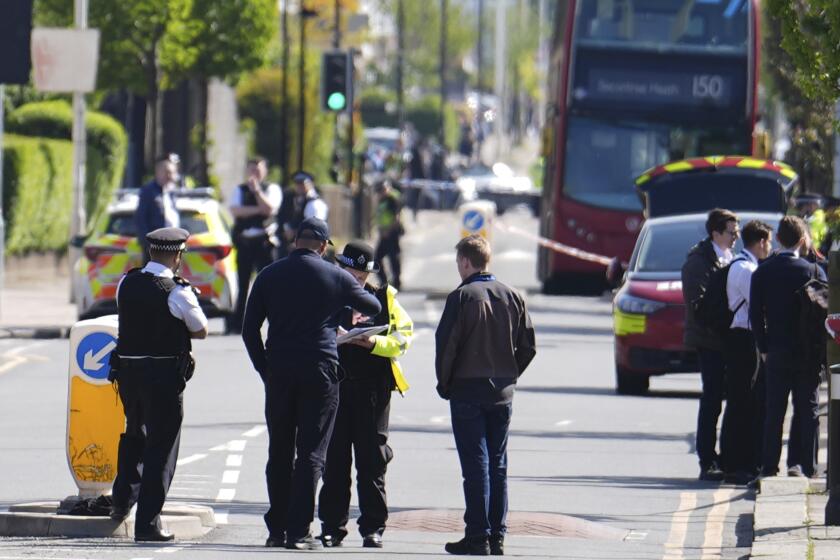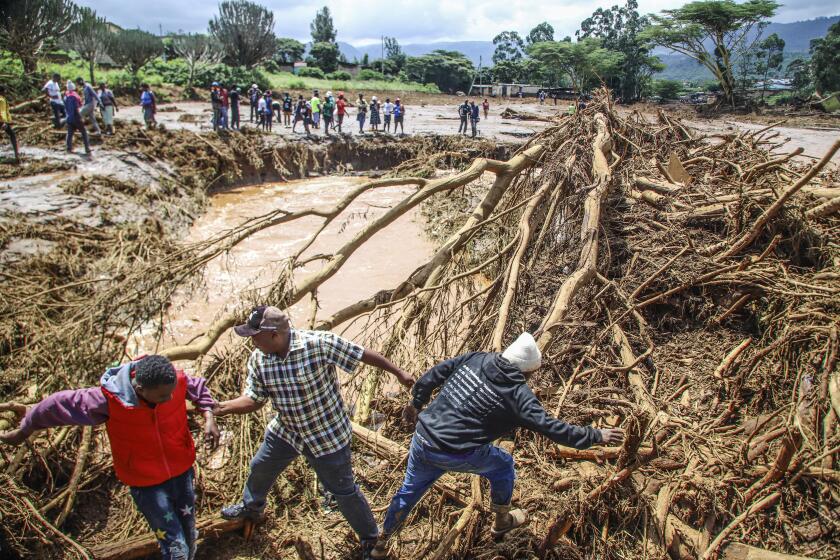Lawsuit seeks asylum for Guatemalans
After four of his classmates disappeared during Guatemala’s civil war, Luis Gonzalez fled his homeland and sneaked across the border into the United States in 1985.
He applied for asylum in 1997 but an immigration judge said Gonzalez failed to prove he personally had been persecuted. Now Gonzalez, a Maywood resident, is facing deportation.
Gonzalez, 40, who is married and has three U.S.-born daughters, is placing renewed hope in a class-action lawsuit filed in federal court last month against the U.S. government on behalf of thousands of Guatemalans who allege that their asylum petitions were unfairly denied.
The lawsuit says that in many cases, immigration officials waited years, or even decades, before rejecting the asylum applications because the conditions in Guatemala had changed. There are about 800,000 Guatemalans in Southern California, and about 40,000 could be affected by the suit, according to the Guatemalan Consulate in Los Angeles.
The 35-year civil war between the Guatemalan army and leftist rebels, which claimed the lives of more than 200,000 people, ended in 1996 with peace accords.
By delaying judgment, U.S. immigration officials misled thousands of Guatemalans into believing they ultimately would be allowed to stay, said Byron Vasquez, director of the Los Angeles’ Casa de la Cultura de Guatemala. During that time, he said, many worked, paid taxes and started families in the U.S. Yet they were living in limbo, unable to become permanent residents or citizens. Now thousands are being deported, he said.
“It’s unfair,” said Vasquez, who is spearheading the lawsuit. “They are washing their hands and sending people back to Guatemala.”
Vasquez also argued that the U.S. is responsible for the welfare of Guatemalan refugees because of its involvement. During the civil war, the U.S. government supported the Guatemalan military, which was responsible for widespread killings and repression of civilians.
Many Guatemalans already have been deported or are fighting deportation orders. Last year, 17,348 Guatemalan nationals were deported, compared to 12,493 in 2005 and 8,084 the previous year, according to U.S. Immigration and Customs Enforcement.
The rise in deportations is due in part to the increased enforcement at the border and across the nation, but also because immigration officials are intent on clearing a backlog of asylum applications filed years earlier.
U.S. Citizenship and Immigration Services spokeswoman Marie Sebrechts could not comment on the lawsuit, but said that each asylum petition is decided on a case-by-case basis. Applicants for asylum must prove a well-founded fear of persecution by their home government because of their race, religion, nationality, political opinion or membership in a particular social group.
“Asylum is a benefit that is based on individual circumstances, not on country circumstances, such as civil war or unrest,” Sebrechts said.
She acknowledged the delay and said it was because asylum applicants were given other opportunities to apply to stay in the country, including through a 1991 settlement in a previous class-action lawsuit against the U.S. government, known as ABC, and through the 1997 Nicaraguan Adjustment and Central American Relief Act, or NACARA.
Not all Guatemalan asylum applicants were eligible for either of the alternate programs, however. To be eligible for benefits under the lawsuit, the applicant must have arrived in the U.S. by Oct. 1, 1990, and applied for asylum by Jan. 3, 1995.
Gonzalez, who said he didn’t know he could petition for asylum when he first arrived, missed the deadline by two years. Even though he didn’t have gunshot wounds as proof, Gonzalez said he had emotional scars from the war and should have been granted asylum when he did apply.
After a judge denied his petition for asylum, Gonzalez pleaded to stay based on the hardship it would cause his children. The judge ruled against him and he lost his appeal in 2002.
Nevertheless, Gonzalez stayed in the U.S. He didn’t want to leave his wife and daughters. And he still feared returning to Guatemala.
“I am scared to risk my life and the lives of my family,” he said. For the U.S. government, he said, “It’s easy to say the war is done, but it’s not true. There are a lot of people getting killed.”
Gonzalez said his 16-year-old nephew was shot to death in 2004. The following year, his brother was killed the same way. Nobody has been arrested for either murder and the motives are unclear.
The legacy of the war has continued and there is still a lot of violence in the country, said Macarena Gomez-Barris, who teaches sociology and American studies at USC.
In February, three Salvadoran legislators were kidnapped and slain and their bodies set ablaze during an official visit to Guatemala City.
About a week later, four officers from a top Guatemalan police unit were slain in their cells after being charged with the murders.
“War and genocide produce long-term effects,” Gomez-Barris said. “I think that is what Guatemala is up against today.”
Not all the plaintiffs were on the same side during the war, Gomez-Barris added. Some are former members of the military.
Marcelino Carrera, 44, said he was a teenager when military recruiters forced him into service, sending him to protect the countryside from guerrilla attacks.
“I told them I’m not of age,” he said, “but they grabbed me, covered my eyes and tied my hands. They told me, ‘It’s time to serve your country.’ ”
Carrera, who lives in Los Angeles, fled Guatemala City in 1989 and made it to Tijuana by jumping into cargo trains for overnight rides. Then a smuggler directed him over the border and into California.
He applied for asylum in 1993 but only this year was his petition denied. He is in deportation proceedings.
If Carrera goes back, he said, he fears that guerrillas could learn of his military past and harm him. Worse, he said, he wouldn’t know what to do with his three children, all born in the United States.
“The injustice is that they waited so long to tell me that I can’t stay,” he said. “If they would have told me earlier, I would have found another place to go.”
Anti-illegal immigration activist Barbara Coe said the Guatemalans who are targeted for deportation are illegally in the country and should return to their homeland.
“There is no civil war going on there and there is no reason for them to be here,” she said. “They need to go home.”
Jesse A. Moorman, who filed the lawsuit, said the solution for many of these Guatemalans may depend on Congress passing a law that would allow them to stay in the U.S.
“I wouldn’t predict that the court would come close to fixing everything,” he said. “But hopefully it will give them some sort of protection to allow them to stay here and work things out.”
*
adrian.uribarri@latimes.com
More to Read
Start your day right
Sign up for Essential California for news, features and recommendations from the L.A. Times and beyond in your inbox six days a week.
You may occasionally receive promotional content from the Los Angeles Times.






